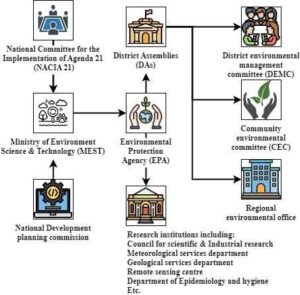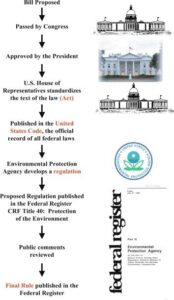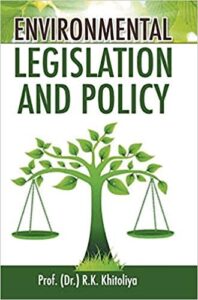Back to: Environmental Biology 300 Level
Welcome to class!
Good to see you again, future environmental leader! Let’s think about this: what would happen if there were no traffic rules on Lagos roads? Chaos, right? The same way traffic rules bring order to our roads, environmental policies and laws help guide how we treat nature—our water, air, land, animals, and plants. Today’s lesson will help you understand how Nigeria uses policies and legislation to protect the environment and promote sustainable development.
Environmental Policies And Legislation
What are Environmental Policies and Legislation?
Environmental policies are plans or principles created by governments to guide decisions and actions related to the environment. Legislation refers to actual laws that enforce these policies, ensuring that individuals, companies, and government bodies act responsibly when dealing with natural resources.

In simpler terms, policies set the goals; laws make sure those goals are followed.
Why Do We Need Environmental Policies and Laws?
To protect natural resources – like forests, rivers, and air from abuse or destruction.
To prevent pollution – and reduce the negative impacts of industrial activities.
To promote public health – by ensuring clean water, safe waste disposal, and reduced emissions.
To guide development – so that infrastructure and industries grow without damaging ecosystems.
To meet global standards – especially in areas like climate change and biodiversity conservation.
Key Environmental Laws and Policies in Nigeria
National Environmental Standards and Regulations Enforcement Agency (NESREA) Act (2007) – NESREA is responsible for enforcing environmental laws and ensuring compliance with environmental standards.

Environmental Impact Assessment (EIA) Act (1992) – Requires all major projects (like road construction, oil drilling, or dam building) to assess environmental impacts before approval.
Harmful Waste (Special Criminal Provisions) Act (1988) – Prohibits the dumping of toxic waste in Nigeria.
National Policy on the Environment (Revised 2016) – Provides a broad framework for environmental management across sectors.
Forestry, Mining, Water Resources Acts – Various sector-specific laws that also influence environmental practices.
International Agreements – Nigeria is part of global treaties like the Paris Climate Agreement and the Convention on Biological Diversity.
Agencies Responsible for Implementation
NESREA – Oversees environmental standards and compliance in non-oil sectors.
Federal Ministry of Environment – Develops and coordinates environmental policy.
National Oil Spill Detection and Response Agency (NOSDRA) – Handles oil spill issues.
State environmental protection agencies – Enforce environmental laws at the state level.
Local Governments – Manage sanitation, waste disposal, and awareness at the grassroots level.
Challenges in Environmental Law Enforcement in Nigeria
Weak enforcement due to corruption or lack of political will
Poor funding and limited trained personnel
Low public awareness and education
Conflicting laws or overlapping responsibilities between agencies

Resistance from industries due to cost of compliance
Even with these challenges, there is growing awareness and action—especially among youths, NGOs, and researchers—towards better environmental protection.
Summary
- Environmental policies and legislation guide how individuals, businesses, and governments manage natural resources.
- Nigeria has several laws and policies like the NESREA Act, EIA Act, and Harmful Waste Act.
- Environmental laws are important for resource protection, pollution control, and sustainable development.
- Agencies like NESREA, NOSDRA, and the Ministry of Environment help enforce environmental standards.
- Challenges include weak enforcement, poor funding, low awareness, and resistance from industries.
Evaluation
- What is the difference between environmental policy and legislation?
- Mention three key environmental laws in Nigeria.
- Name two agencies responsible for environmental enforcement.
- List two challenges facing environmental law enforcement in Nigeria.
- Why are environmental policies important for public health?
Fantastic work today! By understanding Nigeria’s environmental laws and policies, you’re better prepared to be a responsible citizen and future policymaker. Keep learning, keep growing—Afrilearn believes in your power to protect the Earth and transform Nigeria for the better.
